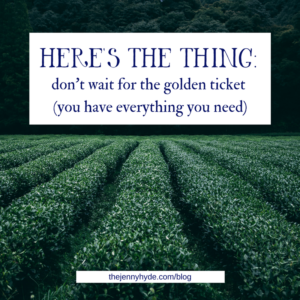 Sometimes I just don’t know where to start. There are so many people telling us we could and should be better, earn more, achieve more.
Sometimes I just don’t know where to start. There are so many people telling us we could and should be better, earn more, achieve more.
I get swept up in it. I wonder whether I should be writing click-bait blog titles or adding more semi-shaming posts to scare you into buying my services.
I can’t. I can’t do it. If that makes me naive or stupid or unbusinesslike, so be it. I want you to know that working with a coach or mentor or even a good friend can make a huge difference to your business.
I want you to know that I know the dark places, the scared places, the stuck places. I want you to know that there’s so much hope even when things can look extremely dark. I want you to know I haven’t made it yet, but I still show up and help people every day.
I’m not for everyone, and that’s okay.
I care, deeply. Some have said too much. But truly, I adore holding space for the confusion and sitting with it as it turns into clarity. I can see a dozen ways forward – at least – for any decision you’re facing. But it’s in everyone’s interests to let you choose the best one for you.
I don’t sell four-figure business solutions. I don’t sell guarantees or pre-made business plans
I offer emotional, practical, effective support for people who want to do it their way, but sometimes get stuck. I’m not better than you. I just spend my time learning how to be their true selves in business. And I hope to share that with you.
Wouldn’t it be lovely to learn the secret? Wouldn’t it be just wonderful to replicate a proven formula for the perfect creative business – not too hard, more than enough money – that looks just like hers?
But it’s not how it works. Otherwise we’d all be doing it.
By all means, learn about colour theory and Instagram hashtags and bookkeeping and different sales platforms.
By all means, read stories of others’ success and failures and take in the lessons.
By all means, stay engaged and open in your quest to understand what people want, how they work, and how you can help them through your business and products and services.
But your business is your own. There’s been nothing like it before. It has different goals, different needs, different limitations to any business on the planet. Yes, there are similarities for all of us. But on a subtle, day-to-day level, it’s different.
“What about that copycat who took all my designs and is making a fortune without having put the work in?” I hear you ask. How long do you think it’ll last? Truly.
“What about all these young folk starting their business now with access to recommendations and resources and marketplaces that didn’t exist for me? I had to do it on my own!” Then you’re set up to keep finding your own way. You already have skills and resilience that they haven’t had the opportunity (or inclination) to learn yet.
There are always people who appear to have it easy. I believe two things: the first is that we don’t truly know what’s easy and what’s not for people. The second is that karma exists, and we’re often given lessons we need to learn.
Here’s the thing
The thing I want most for you is that you go your own way. I believe it’s the most powerful, the most authentic, and the most rewarding path.
Here are the things I ask myself when I’m surrounded by big promises and a foggy outlook:
- Am I looking for a quick-fix, golden ticket answer to a complex and unique question?
- Is this article / post / video asking me to pay a load of cash for a “guaranteed success”? If so, it probably isn’t for me.
- Who are my trusted people? The ones who hold similar values to me, and don’t succumb to quick fixes. (Tips: Rachel Cole, Brene Brown, Randi Buckley, Harriet Lerner, Paul Jarvis, Tara Gentile)
- What do I need to learn about from someone who’s further ahead on the path?
- And what’s my lesson to learn?
- What do I know to be true for myself and my business?
- Where am I getting distracted by something shiny?
- Am I being kind and respectful to my clients and potential clients?
- Am I being kind and respectful to myself?
There’s wisdom out there. But there’s a lot of chaff as well. Go for the good stuff. Find your people. Trust yourself.
Jx
PS One-off one-on-one mentoring will officially return next week. If you’re interested in a power hour of untangling or just want a taster of this work, please get in touch while I sort out my work with me page.




